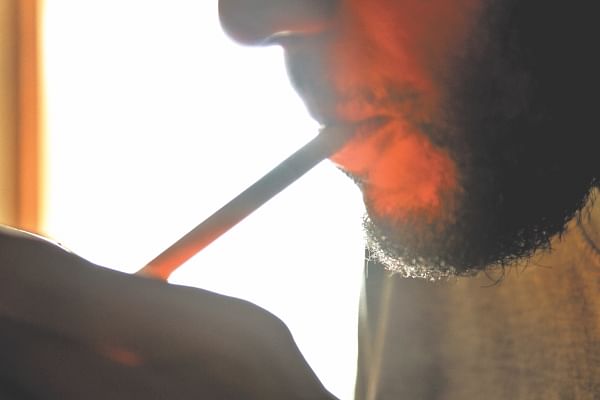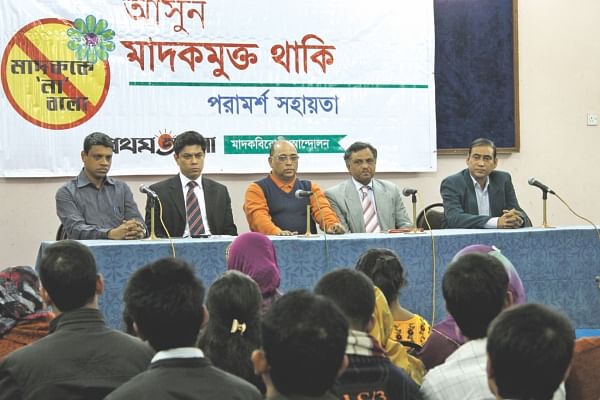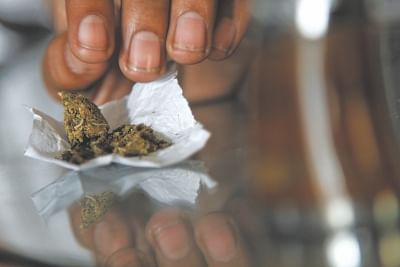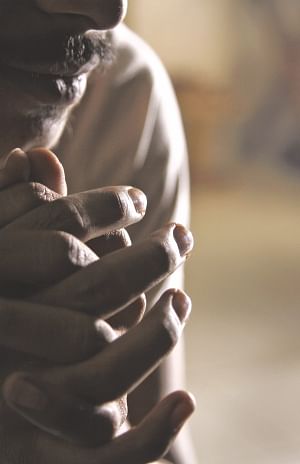| Home - Back Issues - The Team - Contact Us |
 |
| Volume 11 |Issue 05| February 03, 2012 | |
|
|
Special Feature
Behind the Smoke Screen ANIKA HOSSAIN Names of victims of substance abuse and their family members mentioned in this article have been changed to protect their privacy. Rashad Alam was 14-years-old when he started smoking. It started off as a “cool” after school activity with friends, but soon he was smoking a pack of cigarettes or more everyday, even when he was alone. By the time he was 16, he had become a chain smoker. His friends were now trying new substances, and the drug of choice was marijuana, more commonly known as pot, weed, dope, ghaash etc. This cost a bit more than cigarettes, so Rashad started to ask for more pocket money at home. When he was refused, he stopped going to his coaching classes and used the tuition money to buy his weed. His parents started noticing changes in him, he had put on weight, which they thought was normal for a boy his age, he was always tired and slept most of the time, he was no longer interested in sports like he once was, and his teachers at school complained that he was saying inappropriate things in class and never paying attention. He performed poorly in his O' Level exams and was made to repeat all his courses. When he reached the age of 18, Rashad had finally but barely passed his O'Levels. To help him study, his friend had given him a few pills called yaba that would give him a “boost.” He felt better, happier, confident and energised when he took his pills. He felt like he could do just about anything. Taking the drug was fun because it was a group activity. His friends had his back. Nothing could go wrong. Just before his exams though, the effects began to wear off, and Rashad felt exhausted and depressed beyond imagination. For the first of many times in his life, he stole money from his mother's purse to buy more drugs. Rashad is now 30-years-old, he didn't make it through his A' Levels, he never went to college, he can't hold on to any job, he weighs 42 kgs and he refuses to give up his drug habit. Now, when he needs money, he either terrorises his mother by screaming, hitting and breaking things, or he steals. Having tried several different avenues including rehabilitation programmes, psychiatric clinics and de-tox centres, his mother finally decided she needed a support group for herself. “I saw an ad on Prothom Alo by chance, about a group discussion between doctors, parents and addicts, I have never spoken to anyone other than doctors about my son's problem. I wanted to hear what other parents had to say.” She says as she sits with a group of parents, at the WVA auditorium, waiting anxiously for the discussion to begin.
To help people like Rashad's mother and many other parents whose children have become victims of drug abuse, Prothom Alo sponsors monthly meetings with a panel of doctors and recovered addicts to provide a support system and advice needed to overcome addiction. “What we must always remember is that addiction is not a crime,” says Dr Ahmed Helal, one of the panellists at the meeting, “An addict is not a bad person, he is a victim of an illness and therefore parents and family members do not have anything to be ashamed of. They must seek help and advice from relatives and friends and they must seek treatment.” One thing that everyone must be made aware of is that not everyone who uses drugs or drinks is an addict. Vulnerability to addiction differs from person to person. People use drugs for different reasons, either for recreation, to enhance one's performance at school or work or to overcome depression or anxiety the list goes on. Addiction depends on ones genes, mental health and family and social environment. If there is a family history of addiction, traumatic childhood experiences, history of mental illnesses and early use of drugs, these can be risk factors for addiction. Whether a person is smoking or injecting drugs can also determine addiction.
Narmin Jamal's son has been addicted to yaba for several years. “My husband suffers from schizophrenia and the doctors say that my son also suffers from depression,” says Narmin, “I have put him in several rehabilitation programmes, in fact he is in a clinic at the moment, but every time he is released, he relapses. I can see that he tries hard to control his urge to take the drug, and each time, he is confident that he can do this, but he fails every time. What scares me is that when he does take yaba, he can hide the symptoms well, when he is going through a bad time, he refuses to take medication, he lies to get money and he seems to hate his family. He dropped out of university a few years ago to focus on getting better, but I don't know if he can.” Between taking care of her husband and her son, Jamal finds herself in financial trouble. “I have tried to tell my close relatives, but no one understands. They think my son is a bad person. I am a housewife and I cannot afford treatment for two people. My back is against a wall now,” saysNarmin. “In these situations, we often recommend long acting anti-psychotic drugs for the patient,” says Dr Bhowmik, “The patient must continue treatment. Since the addiction is directly related to the psychosis, it is crucial for the patient to get regular counselling.” Dr Mohit Kamal agrees, “Addiction is a chronic relapsing brain disease that can happen due to many reasons. Counselling is necessary to find out why a person has started using drugs, whether it is due to anger management problems or lack of social skill development or something else, that area can be focused on and improved to get rid of the necessity to use addictive substances. I have seen patients who have relapsed 18 times, but they have now recovered. So parents must not give up hope.” “When addiction is related to a chronic psychosis, it is important for parents to accept that while the addiction can be overcome, the psychosis will last a lifetime,” says Dr Taj-Ul Islam, “It is therefore important for the parents and other family members to get counselling and help alongside the victim, so they are mentally healthy enough to take on such a tremendous, taxing responsibility.”
According to the panellists, while different drugs can take on different psychical effects, all abused substances can alter the way the brain looks and functions. Recreational drugs such as marijuana, yaba heroine, Phensedyl and dandy (glue) cause a surge in the levels of dopamine in the brain which triggers a feeling of pleasure that the brain remembers and wants repeated. If the abuse continues, these substances take on the same importance as other survival related behaviours such as eating and drinking. Eventually they interfere with thinking, behaviour control and judgment skills. These drugs become more important than family, friends, career and even one's own health and happiness. “My son had been addicted to heroine for 7 years and has been drug free now for 13 months,” says Lutfunnessa Khan. “He is now doing his A'Levels and also has a job and is making good money. What worries me is that lately, he refuses to contact his counsellors from his rehab centre. He gets irritated when we ask him to do so and says he is confident that he no longer needs them. We are thinking of sending him abroad to complete his studies, away from bad influences of his friends.” “That is unfortunately, one of the first signs of relapse,” says Dr Taj-ul Islam. “When a person relapses, there are signs, his lifestyle will start to noticeably deteriorate and s/he will refuse to go to people who will notice this. The addict may act over confident about their ability to control themselves, but family members should not stop encouraging them to seek counselling.” “Sending an addict away from familiar surroundings is no guarantee that they will recover,” says Dr Kamal, “Abusive substances are available in every country and an addict can always find a new substance if they choose to.” “It is important to talk to the victim normally and openly and create an environment for open communication,” says Dr Bhowmik. Shouting and arguing and lecturing will not solve anything. Talking and listening respectfully is the key to communication.” When dealing with an addict it is important for family members to know the warning signs of abuse. Some common signs include: bloodshot eyes, dilated pupils, change in appetite and sleep patterns, sudden weight loss or gain, deterioration in physical appearance/grooming: unusual smells, tremors, slurred speech or trouble with coordination. The addict will also experience a drop in school/work performance, will have an inexplicable need for money, be secretive and suspicious, will have a new group of friends. They will also have sudden inexplicable mood swings, periods of hyperactivity/ agitation and periods of lethargy (spaced out). They will also act fearful, anxious and paranoid for no reason. “In many cases, an addict may be able to stop taking drugs on his own,” says Dr Iftekhar Ahmed Chowdhury, “They should be given a chance to do so and failing that, they must be encouraged to get treatment.” “Keeping someone locked up will never cure them from addiction,” says Dr Taj-ul Islam, “They should be given a chance to help themselves, they should be observed carefully and assessed by friends and family and they should receive regular counselling. If the treatment is too expensive, families should seek help from government institutions. I myself am willing to give free treatment to those who really need it.” “I have been drug free for over five years now,” says Roushan Hasan, “I believe it's because my parents have had faith in me. When people treated me differently, I badly wanted to get better and I felt helpless because I couldn't. I knew I wasn't a bad person and my mother reminded me of that every day. She supported me throughout and never gave up hope. That support is vital for a person's recovery.” Drugs are affordable and available in every corner of Dhaka city. It is easy for any child/adult to be lured into an addiction. Often it is beyond the control of their parents and guardians. It is important not to blame anyone, to be careful, keep a close eye and if needed, to get help as soon as possible. Through this initiative taken by Prothom Alo, many parents have found their much needed support system and many addicts are on the path of recovery. Copyright
(R) thedailystar.net 2012 |
||||||||



